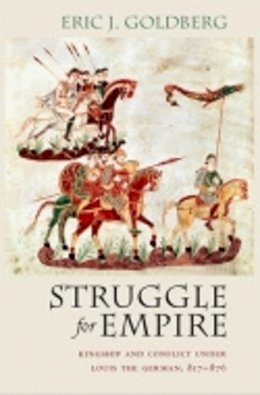
Struggle for Empire: Kingship and Conflict under Louis the German, 817–876
Eric J. Goldberg
Struggle for Empire explores the contest for kingdoms and power among Charlemagne's descendants that shaped the formation of Europe. It examines this pivotal era through the reign of Charlemagne's grandson, Louis the German (826–876), one of the longest-ruling Carolingian kings. Eric J. Goldberg's book brings the enigmatic Louis to life and makes a vital contribution to recent reevaluations of the late Carolingian age.
In the Treaty of Verdun of 843, Louis inherited the eastern territories of the Carolingian empire, thereby laying the foundations for an east Frankish kingdom. But, as Goldberg emphasizes, Louis was never satisfied with his realm beyond the Rhine. Louis was a skilled and cultured ruler who modeled himself on Charlemagne, and he aspired to rebuild his grandfather's empire. This ambition to reunite Europe brought Louis into repeated conflict with other rulers: Carolingian kings, Byzantine emperors, Bulgar khans, Roman popes, and Slavic warlords. While Louis ultimately failed to reunify the empire, his fifty-year reign produced a period of remarkable political consolidation and cultural creativity in central Europe.
By highlighting the ways in which dynastic rivalries, aristocratic rebellions, diplomacy, and warfare shaped Louis's reign, Struggle for Empire uncovers the dynamism and innovation of ninth-century kingship. To trace Louis's evolving policies, Goldberg moves beyond the evidence traditionally used to study his reign—the Annals of Fulda—and exploits the visual arts, liturgy, archeology, and especially charters. The result is a remarkably comprehensive and colorful picture of Carolingian kingship in action.
Product Details
About Eric J. Goldberg
Reviews for Struggle for Empire: Kingship and Conflict under Louis the German, 817–876
H-German
H-Net Reviews
A highly readable and well-illustrated account of an important stage of the early Middle Ages.
American Historical Review
Carolingian rulers did not know that by the year 888 death and the failure to produce legitimate heirs would so reduce their bloodlines that the Frankish nobles would turn elsewhere to enhance and authorize their own power. Thus they never gave up the dream of reconstituting Charlemagne's empire. Eric Goldberg's detailed and nuanced account of the life and reign of Louis the German nicely illustrates that fact, conveying both the success and the tragedy of the dynasty. This is a beautifully designed book, both in concept and in execution. The author uses a wide variety of sources—charters as well as chronicles, along with seals and clothing, books and paintings, and architectural and archaeological remains—to great effect.
Speculum
I predict the book will be a classic.
Medieval Review
Louis the German is known mainly in the context of the Treaty of Verdun and the 'birth' of Germany. Eric Goldberg has written a valuable and stimulating book that scrapes away those anachronisms and puts Louis back into his proper context. Cornell has done a superb job producing this book, which has attractive illustrations.
German Studies Review
This is a wonderful book by a gifted historian.
International History Review
